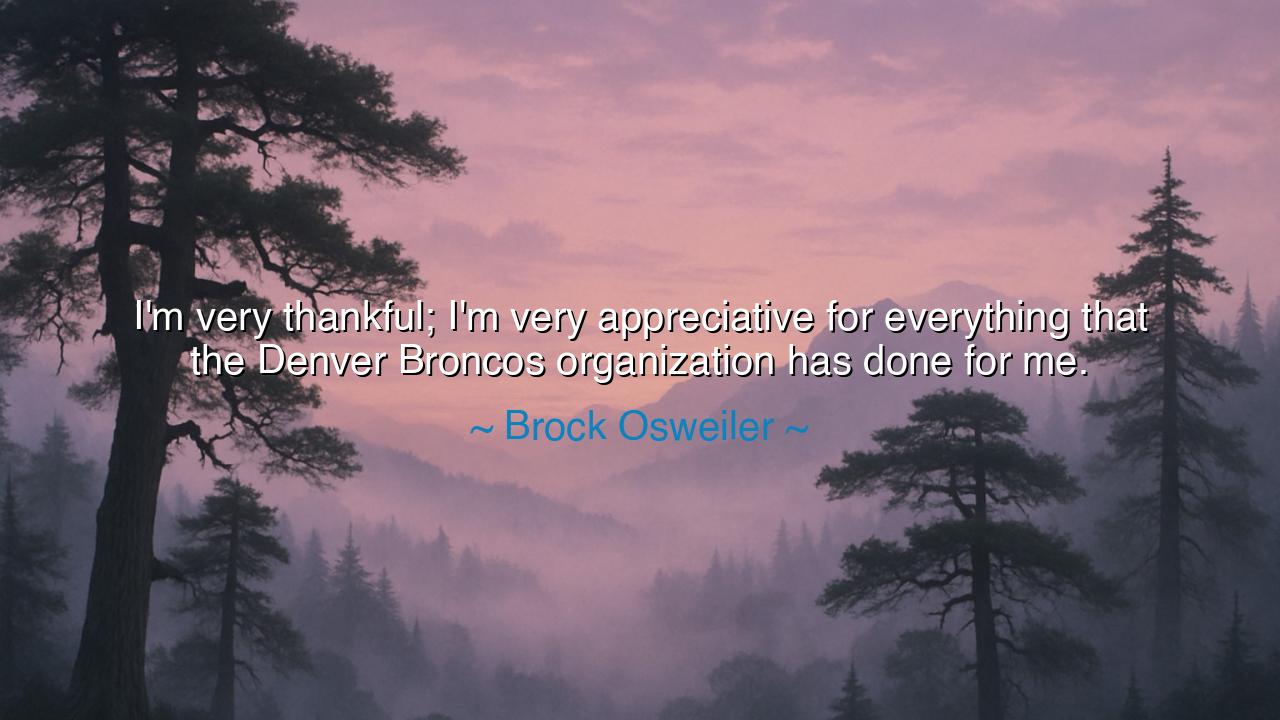
I'm very thankful; I'm very appreciative for everything that the
I'm very thankful; I'm very appreciative for everything that the Denver Broncos organization has done for me.






In the words of Brock Osweiler, quarterback and warrior of the gridiron, we hear a voice not of arrogance, but of humility: “I’m very thankful; I’m very appreciative for everything that the Denver Broncos organization has done for me.” Though brief, this statement resounds with wisdom that transcends the sport itself. It is the voice of a man who recognizes that no journey is walked alone, that behind the individual triumphs of the athlete stands the support of an organization, a family, a community of faith and labor.
The Denver Broncos, for Osweiler, were not only a team but a crucible. They gave him opportunities, guidance, and trust at crucial points in his career. To be thankful in such a context is to honor not only the victories and glories of the field, but also the unseen labors of coaches, staff, teammates, and leaders who created the conditions for his growth. Gratitude in this sense is not small—it is expansive, acknowledging the countless invisible strands that weave together to form a career.
This truth has deep roots in history. Consider the tale of Alexander the Great, who, though conquering vast empires, never failed to honor his teacher Aristotle and the generals who guided him in his youth. He knew that his victories were not forged in isolation, but in the training, wisdom, and discipline instilled by those who came before him. Just as Alexander gave thanks for his foundation, Osweiler’s words remind us that the wise never forget the soil from which they sprang.
There is also a spirit of humility in his words. Many men, when raised to power or placed in the spotlight, begin to believe their success is solely their own doing. But Osweiler’s acknowledgment of the Broncos reveals that he did not see himself as self-made. Gratitude tempers pride, and pride without gratitude is the path to downfall. His voice reminds us that to remain grounded is to remain strong, and that strength without humility is brittle and fleeting.
The mention of being both thankful and appreciative deepens the meaning. Thankfulness is the inner recognition of a gift; appreciation is the outward act of honoring it. Together they form a complete circle of respect: to recognize the blessing within and to express it without. It is not enough to feel gratitude silently—one must speak it, show it, and live it. In doing so, one strengthens the bonds of loyalty and leaves behind a legacy of honor.
The lesson for us is clear: whatever our field of labor, we must never forget those who have lifted us along the way. Be it a company, a mentor, a teacher, or a friend, success is never the work of the self alone. To speak gratitude is not weakness but greatness, for it declares that we understand the vast web of effort and faith that surrounds our lives.
Practically, this means pausing often to look back and name those who helped us. Write to them, speak their names, honor their part in your journey. In your workplace, acknowledge the efforts of those unseen. In your family, remember the sacrifices made for your path. Let your appreciation be living and active, not hidden and assumed.
Thus the wisdom of Brock Osweiler endures: “I’m very thankful; I’m very appreciative.” His words are not just about football—they are about life itself. For the teams we play upon may differ, but we all walk upon fields built by others. Let us, then, be a people of gratitude, never forgetting the foundations of our victories, and always speaking honor to those who made them possible. In this way, humility and thankfulness become our truest triumph.






AAdministratorAdministrator
Welcome, honored guests. Please leave a comment, we will respond soon